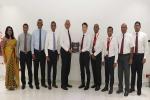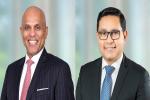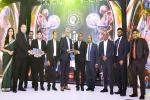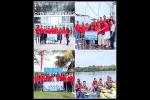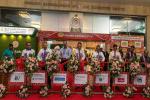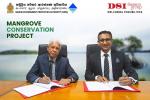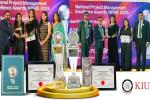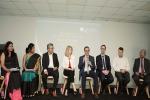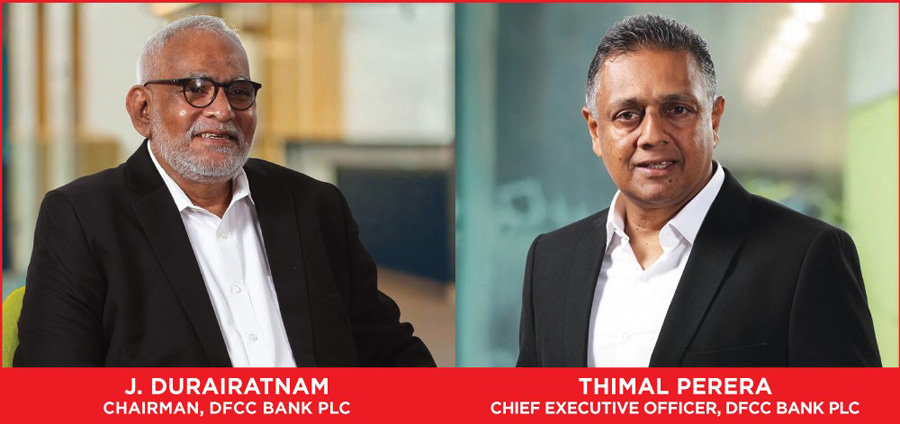The Bank recorded notable expansion in key areas, including loans and deposits, underscored by an 11% rise in net interest income, supported by a deliberate strategy to drive credit growth and optimise funding costs.
Credit expansion remained a central focus, with the Bank’s loan portfolio increasing by 19% during the six-month period.
This growth was achieved amidst a softening interest rate environment and reflects DFCC Bank’s continued commitment to supporting national economic recovery through targeted lending.
While market interest rates have stabilised at lower levels, the Central Bank of Sri Lanka (CBSL) has signaled potential further reductions, continuing its accommodative monetary policy stance.
Private sector credit flows remain robust, with key industries benefiting from improved liquidity.
This positive momentum is expected to continue through the remainder of the year.
Although interest income had been under pressure in previous periods due to declining market rates, DFCC Bank recorded a modest increase in interest income during the first half of 2025.
This was primarily driven by the scale of lending expansion, alongside a strengthening CASA base.
These developments reaffirm the Bank’s strategic emphasis on asset growth, its prudent financial management, and its long-term orientation towards sustainable value creation.
DFCC Bank also marked a milestone with the launch of its Islamic Banking proposition - a new growth avenue aligned with the Bank’s vision for greater inclusion, diversity, and ethical financial access.
This commentary relates to the unaudited financial statements for the period ended 30 June 2025, presented in accordance with Sri Lanka Accounting Standard 34 (LKAS 34) on Interim Financial Statements.
Income Statement Analysis Profitability
DFCC Bank PLC, the largest entity within the Group, recorded a Profit Before Tax (PBT) of LKR 7,910 Mn and a Profit After Tax (PAT) of LKR 5,555 Mn from continuing operations, compared to a PBT of LKR 7,237 Mn and PAT of LKR 4,654 Mn in the same period last year.
The Bank’s Earnings Per Share (EPS) from core operations was LKR 12.74, while the EPS including the gain from the disposal of the Acuity Partners (Pvt) Ltd stake stood at LKR 24.13.
At Group level, PBT was LKR 8,172 Mn and PAT was LKR 5,747 Mn from continuing operations, compared to LKR 7,479 Mn and LKR 4,875 Mn, respectively, in 2024.
The Bank’s Return on Equity (ROE) stood at 14.95%, while Return on Assets (ROA) before tax was 2.37% for the period ended 30 June 2025, inclusive of the disposal gain recorded under profit from discontinued operations.
Net Interest Income
During the six-month period, the Bank achieved a 1% increase in interest income and a 5% reduction in interest expense - underscoring resilience amidst market pressures.
Interest income growth was largely driven by an 19% expansion in the loan portfolio, reflecting DFCC Bank’s strategic focus on quality asset growth.
This was achieved despite a subdued interest rate environment, reinforcing the Bank’s disciplined lending and portfolio management.
Interest expense reductions were aided by improvements in the Bank’s CASA ratio and prevailing low interest rates.
The CASA ratio rose from 24.77% at 31 December 2024 to 26.54% at 30 June 2025, reflecting a stronger deposit mix and improved funding cost efficiency.
Net Interest Income, the Bank’s core earnings driver, increased by 11% to LKR 15,167 Mn - highlighting effective loan book expansion and funding cost optimisation.
However, the Net Interest Margin declined from 4.18% in December 2024 to 4.10% by June 2025, largely due to the Bank’s competitive positioning and prevailing market dynamics.
Fee and Commission Income
The Bank’s proactive strategies drove higher volumes across remittances, credit-related charges, trade-related commissions, and other fee income activities.
Credit card growth also supported this growth.
To support customer acquisition and card portfolio growth, related fee expenses rose - but the net effect remained positive.
Net fee and commission income increased by 43% to LKR 3,249 Mn, compared to LKR 2,274 Mn in the same period of 2024.
Impairment Charge on Loans and Other Losses
The Stage 3 impaired loan ratio improved to 4.62% in June 2025, from 5.65% in December 2024 - driven by successful recoveries and portfolio growth.
Impairment provisions were prudently made, incorporating model calibrations and additional buffers for high-risk sectors by considering global and local economic trends.
Consequently, impairment charges for loans and advances rose to LKR 3,073 Mn, from LKR 1,955 Mn in the previous period.
Operating Expenses
Technology and digital transformation remained a key priority.
The Bank continued upgrading its IT infrastructure to support enhanced multi-channel service delivery.
As a result, operating expenses rose to LKR 8,325 Mn in the first half of year 2025, up from LKR 7,567 Mn in the comparable period.
Despite these investments, the Bank remains focused on strategic cost optimisation across functions.
Other Comprehensive Income (OCI)
OCI included fair value gains from equity and fixed-income securities, alongside movements in hedging reserves.
Exchange rate volatility was minimised through hedge accounting practices.
Equity securities posted a fair value gain of LKR 2,848 Mn, primarily due to an increase in the share price of Commercial Bank of Ceylon PLC.
Treasury bill and bond yield gains amounted to LKR 2,080 Mn during the same period.
Financial Position Analysis Assets
Despite economy related and sector based challenges, DFCC Bank’s total assets grew by LKR 83.7 Bn - a 12% increase since December 2024.
The net loan portfolio expanded by LKR 74 Bn to LKR 469 Bn, reflecting a 19% growth (compared to LKR 394 Bn as at 31 December 2024).
This expansion is consistent with the Bank’s growth agenda and the improving economic backdrop.
Liabilities
DFCC Bank’s total liabilities rose by LKR 72 Bn marking a 12% increase from December 2024.
The Bank’s deposit base increased by 14% reaching LKR 530 Bn compared to LKR 465 Bn as at 31 December 2024.
The resulting loan-to-deposit ratio stood at 97.79% as at 30 June 2025, while the CASA ratio stood at 26.54%.
The Bank continued to leverage medium- to long-term concessionary credit lines for targeted lending expansion and affordable financing. Including these term borrowings, the adjusted.
CASA ratio improved to 32.39%, and the adjusted loan-to-deposit ratio stood at 90.00% as at 30 June 2025.
Equity and Capital Compliance
As at 30 June 2025, total equity increased by LKR 12 Bn, supported by a profit after tax of LKR 10.5 Bn and fair value gains across the Bank’s securities portfolios.
In alignment with the Bank’s growth strategy and the improving economic condition, the net loan portfolio grew by 19%.
Leveraging the strengthened equity base, the Bank was able to absorb the additional capital requirements associated with this portfolio growth.
As a result, the Tier 1 Capital Ratio was maintained at 12.479%, and the Total Capital Ratio at 15.004%, compared to 12.402% and 15.759%, respectively, as at December 2024.
The Bank’s Net Stable Funding Ratio (NSFR) stood at 112.81%, while the Liquidity Coverage Ratio (LCR) – all currency reached 187.47%, both comfortably exceeding regulatory minimums.
CEO’s Statement
Amidst a gradually stabilising macroeconomic environment - characterised by easing monetary policy, renewed credit flows, and a return of investor confidence - DFCC Bank delivered a strong performance in the first half of 2025.
The Bank recorded a Profit After Tax of LKR 10.5 Bn at Bank level, including a one-off gain from the strategic divestment of its 50% stake in Acuity Partners (Pvt) Ltd, while Group core business PAT reached LKR 5.7 Bn.
Total assets rose by 11% to LKR 788 Bn, supported by a 19% expansion in the loan portfolio. Net Interest Income increased by 11%, and the CASA ratio improved to 26.54%.
Despite rapidly declining interest rates, interest income recorded a growth, enabled by strategic lending expansion and optimised funding structures.
This performance was driven by a range of purpose-led, customer-centric propositions that continue to deliver long-term value.
The Bank’s home ownership proposition was enhanced by reducing approval times and streamlining access to housing finance.
Its mobility financing offering prioritised accessibility and affordability, enabling greater vehicle ownership across a broader customer base.
In the informal and underbanked segments, gold-backed lending solutions provided flexibility and immediacy, while a strengthened remittance proposition offered Sri Lankans abroad a secure, trusted, and emotionally meaningful way to support families at home.
Dedicated financial support for senior citizens was also strengthened, addressing evolving needs within this demographic.
Inclusion and empowerment remained central to the Bank’s strategy.
The launch of its Islamic Banking proposition opened a new avenue for ethical, faith-aligned financial services.
The women’s banking proposition, DFCC Aloka, surpassed the milestone of 100,000 customers - underscoring the Bank’s commitment to gender-focused financial access.
Strategic partnerships, such as the collaboration with the Ceylon Chamber of Commerce,
deepened economic understanding among clients, while DFCC Bank also served as a lead arranger in mobilising development finance for Satin Creditcare - expanding financial access to underserved communities.
On the international stage, DFCC Bank became the first foreign corporate to list a green bond on India’s NSE IX at GIFT City - completing a historic triple listing across Colombo, Luxembourg, and now India.
Beyond its commercial footprint, the Bank also advanced its commitment to national well- being.
The Ride for Life bikeathon, conducted in June, took the message of mental health awareness across Sri Lanka - highlighting a continued focus on holistic, human-centered corporate responsibility.
As DFCC Bank commemorates 70 years of service to Sri Lanka in 2025, this performance reflects not only operational resilience, but also clarity of purpose.
The Bank remains deeply grateful to its customers and stakeholders for their enduring trust, understanding, and confidence.
It is this belief that continues to shape DFCC Bank’s journey - one defined by sustainability, innovation, and an unwavering commitment to customer centricity.
